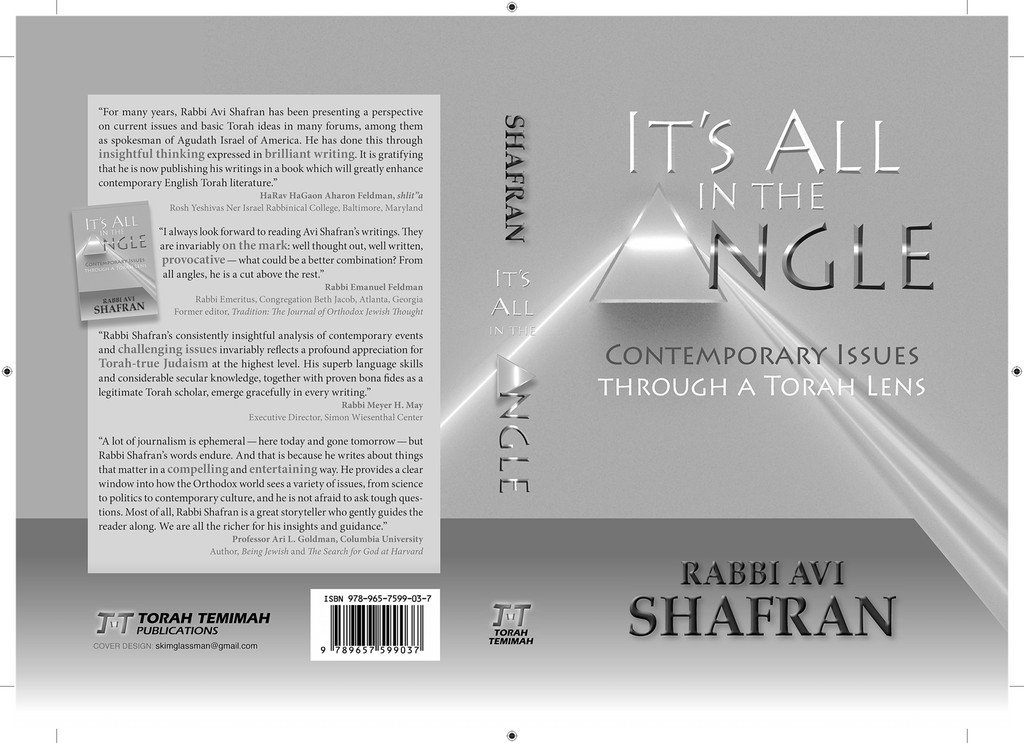The Kosher Bookworm: Shafran literary quality in review
With Chanukah still very much on our minds this week, it has been my want to check out some recent and not so recent writings concerning this loved and popular holiday.
Among those most recent anthologies received lately is one containing some of the most incisive writings on Jewish related topics by one of the most astute observers of the contemporary scene, Rabbi Avi Shafran. Entitled, “It’s All in the Angle: Contemporary Issues Through A Torah Lens” [Torah Temimah Publications, 2012] this anthology is divided into five sections dealing with such diverse topics as hashkafah and mesorah, morality and humanity, science, anti-Semitism, and Yom Tov.
Each section contains some twenty short essays bravely touching upon some of the most controversial issues of recent times with sober and informed observations by Rabbi Shafran reflecting his take, in a most respectful style, absent the rancor and rants of others.
Rabbi Shafran has proven, as demonstrated time and time again in this volume, that showing respect for an opposing point of view in no way diminishes one’s beliefs and convictions. Further, one’s religious observances and beliefs are clearly not compromised by admitting to error or the acceptance of modern scholarship that serves the Torah community with honor.
In his introduction Rabbi Shafran hints at this perspective, and eloquently notes the following:
“Mundane or profound, most subjects seem to evoke as many opinions as there are minds to conceive them.
“That is a wonder pithily expressed by Chazal in the Midrash with their teaching that ‘just as people’s faces differ, so do their opinions.’ And thereby we are charged with recognizing that others’ points of view are not inferior to our own, only different.”
This observation is the hallmark of Rabbi Shafran’s literary legacy and the foundational basis to his success.
I would like to share with you a few Chanukah observations from Rabbi Shafran, to demonstrate his keen intellectual prowess for your edification and appreciation. The first is from his essay, “The Original Spin on Chanukah.” The author first makes the following telling and justifiably sharp observation: “Chanukah has been appropriated by a host of Jewish leaders and pundits for their own, often partisan purposes…..
“Chanukah, however, isn’t celebratory Silly Putty. It has a long, deep, and clear tradition in classical Jewish texts, from the Gemara through the mystical works based on the Arizal, to those of the Chassidic masters.”
Delving into the historical and theological meaning of Chanukah, Rabbi Shafran observes:“For the rededication of the Beis Hamikdosh, from which the holiday takes its name, and the military victory over the Seleucid King Antiochus that preceded it were unmistakable expressions of resistance to assimilation.
“The real enemy at the time of the Maccabees was not the Greek Seleucid empire as an occupation force, but rather what Seleucid society represented: a cultural colonialism that sought to erode the beliefs and observances of the Jewish religious tradition, and to replace them with the glorification of the physical and the embrace of much that Judaism considers immoral. The Seleucids sought to acculturate the Jewish people, to force them to adopt a ‘superior,’ ‘sophisticated,’ wholly secular philosophy. And thus the Jewish victory, when it came, was a triumph over assimilation. The Maccabees succeeded, in other words, in preserving Jewish tradition, in drawing lines.”
This is pretty sharp stuff from so sensitive a writer, who so accurately seeks to debunk the liberal theological and left-wing political bent that others give this sacred holiday.
In another holiday themed essay, “Soulless,” Rabbi Shafran demonstrates his knowledge of Hellenic culture and the dichotomy with Jewish belief.
“Hellenism, focused as it was on reason and inquiry, produced unprecedented celebration of the physical world. Hundreds of years before the Common Era, Eratosthenes calculated the earth’s circumference to within 1%; Euclid conceived and developed geometry; Aristarchus proposed a heliocentric theory of the solar system. And the early Greeks’ investigation of the physical world included as well, and prominently, the human being – but only as a physical specimen, essentially an animal……And so it followed almost logically that the culture that was Yavan saw the Jewish focus on the Divine as an affront.
“Shabbat denied the unstopping of the physical world; brit milah implied that the body is imperfect; Kiddush hachodesh imparted holiness where there is only mundane periodicity; and modesty or any sort of limit on indulgence in physical pleasure was simply unnatural.”
All the above points to a special and very deeply appreciated method of writing that makes Rabbi Shafran’s writings so special, to thus recommend this work for your intellectual and spiritual edification.
FOR FURTHER STUDY
I would like you to note a new book on Torah-oriented psychology, “The Jewish Art of Self Discovery” [Urim Publications,2013] Lakewood ordained, Rabbi Benjamin Rapaport. of Great Neck. Woodmere’s Rabbi Moshe Weinberger, rabbi of Aish Kodesh, writes,”The more I read this remarkable sefer, the more convinced I am that its time has arrived……His ability to capture the essence of avodat Hashem in such a clear and elegant way has given birth to a new masterpiece in the growing world of English Torah literature. Faith is, in fact, a skill, an art that was programmed by the Creator into each and every one of us. The difficulty lies in uncovering, in discovering that burning fire of faith simmering within.”

 50.0°,
Overcast
50.0°,
Overcast 







